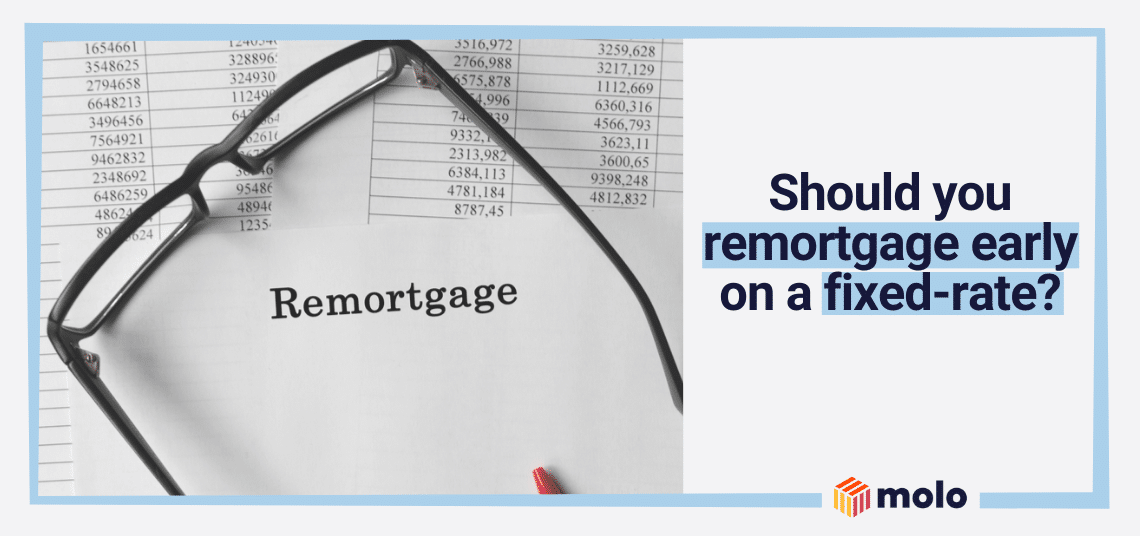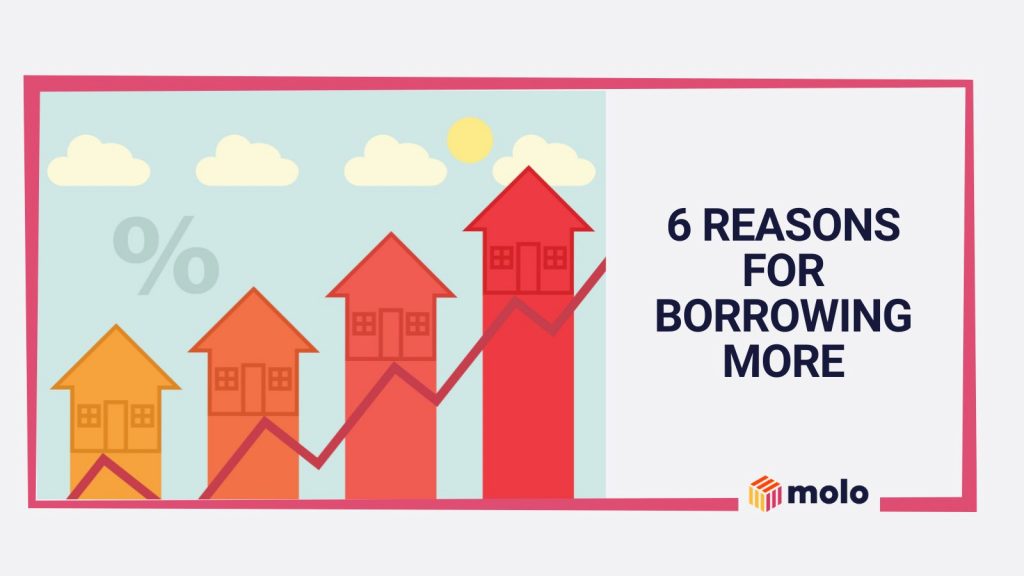Leaving your fixed-rate early
Fixed-rate mortgages give you security. You’re locked into a price for a set amount of time and know exactly how much you need to pay each month. But what happens if you consider leaving your fixed-rate early and decide to remortgage? Can you remortgage before the end of a fixed term, should you, and what are the pros and cons? We’ve put this guide together with everything you need to know about remortgaging early on a fixed rate.
What is a fixed-rate mortgage?
Put simply, a fixed-rate mortgage gives you an interest rate for a set period of time, usually between two and five years, but it can be longer. What does that look like in practice?
Let’s say you borrowed £150,000 on a £200,000 home at a rate of 1%. That percentage is fixed for two, five, 10 or even 30 years. You know you won’t pay more than 1% on the interest during that fixed rate, which leaves your mortgage repayments at around £565 per month.
Because you know what you’ll pay each month, there’s no need to worry about interest rates going up and your mortgage cost changing as you’re locked into the fixed rate. Once the fixed rate ends, you go onto the standard variable rate (SVR), though most people remortgage onto a new rate when the initial one ends.

Remortgage early
- Borrow up to 80% loan to value
- Remortgage your property as an individual or limited company
Why you might decide to remortgage early
Most people are happy with their fixed rate and stay with it for the entire term. There may be some cases, however, where you decide to remortgage early. This could be because you’ve found other mortgage products offering a better rate than the one you’re currently on, which would mean lower monthly payments. Or perhaps you have a buy-to-let property that has increased in value, and you want to borrow more against it to fund your next investment. Other reasons may include a change of circumstances, such as starting a family, divorce or bereavement.
Can you remortgage early on a fixed rate?
The short answer is yes. Yes, you can. Legally, there’s no reason why you can’t leave your fixed-rate mortgage early and move it to another lender. Whether you should is another question entirely. You will most likely need to pay an early repayment charge and exit fee if you decide to switch the mortgage before the fixed rate ends.
You’ll need to think about these factors before deciding if remortgaging is worth it. Of course, the final decision is down to you, and you should have all the information to hand before remortgaging early during your fixed-rate period. The length of the fixed rate also plays a role, with two-year deals costing less to exit than 5-year options.
Remortgaging on a 2-year fixed rate
The main thing to look out for when remortgaging before the fixed rate ends are the early repayment charge (ERC) and exit fee. You’ll need to check with the lender to see how much each of these charges cost, but an ERC is usually a percentage of the time left on the fixed rate.
Eg, 2% for two years and 1% for one year. If your mortgage is £150,000 and you remortgage in the first six months, you can expect to pay an ERC of £3,000 if we’re going by the 2% charge.
Remortgaging on a 5-year fixed rate
A five-year fixed-rate mortgage works much the same way as a 2-year fix when it comes to repayment. The first year will likely see you pay an ERC of 5%, the second year 4%, third year 3%, second year 2% and 1% for the final year. Remortgaging six months into a five-year fixed-rate mortgage is costly: you’d pay £7,500 at 5% on borrowings of £150,000.
Remortgaging before the end of the fixed term
Whether you should remortgage before the end of the fixed term is a decision you would need to make based on your circumstances, and you should take all the factors into consideration before making a decision. If you want to remortgage onto a lower rate and the savings you’ll make on the new mortgage are better than the cost of ERCs, then remortgaging earlier could be a savvy move. However, it’s still quite rare for people to remortgage during the fixed rate, especially on two-year fixed deals, as they don’t run for very long.
Should I remortgage early?
That’s not for us to answer directly, but you should take all the factors into consideration before making a decision. If you want to remortgage onto a lower rate and the savings you’ll make on the new mortgage are better than the cost of ERCs, then remortgaging earlier could be a savvy move. However, it’s still quite rare for people to remortgage during the fixed rate, especially on two-year fixed deals, as they don’t run for very long.
Fees to consider while remortgaging
Early repayment charge
Again, this is the cost you pay for leaving the mortgage early. It’s only applicable if you remortgage during the initial period of your fixed-rate mortgage. Expect to pay a percentage of the years left, eg, 1% for one year, 2% for two years, etcetera.
Exit fees
Exit fees are applicable on many types of mortgages, and some are even required when you finish paying a mortgage off in full. If your lender has an exit fee, expect to pay this when you leave the mortgage, whether it’s during the fixed-rate period or when it’s finished.
Valuation fees
Some lenders charge a valuation fee to determine the value of your home; other’s offer it for free as part of the service. You’ll need to check with the lender to see their stance on the costs involved with valuations, but you could pay anywhere between £600 and £1,250 if it’s your responsibility to cover the cost.
Arrangement fees
Also known as a product fee, the arrangement fee is a charge attached to a particular mortgage deal. The fee can usually be bundled onto the mortgage, so you pay it off monthly along with the amount borrowed. However, there is the option to pay upfront if you prefer.
Broker fees
If you use a broker, you might need to pay a fee. This isn’t always the case, as some brokers offer their service to homebuyers for free. Always confirm with the broker before agreeing to let them help you find a mortgage.

Remortgage early
- Borrow up to 80% loan to value
- Remortgage your property as an individual or limited company
How to remortgage before your fixed rate ends
Most fixed-rate mortgages require you to commit to at least six months, so it’s unlikely you’ll be able to remortgage before this time period. If you do decide to remortgage after six months, you can shop around and look on comparison websites for the best deals or check with specific lenders to see their rates. Contact your current lender to see if there are any penalties involved with leaving early. Then you can decide if it’s something you wish to pursue and get the wheels in motion for remortgaging before your fixed rate ends.
Why don’t people usually remortgage early?
The primary reason for people to stay on their mortgages is because it’s tied to an initial rate. If they were to change during the initial period, they would likely incur an early repayment charge. This can potentially mean paying thousands to get out of your mortgage depending on when the initial period expires.
Remortgaging with the same lender
Many mortgage owners decide to remortgage with the same lender because it’s usually an easier process. The lender already has your details and will often send you a reminder just before your current rate finishes to offer you new mortgage deals.
You can also expect to pay fewer fees as you will avoid legal costs and possibly even valuation fees. However, the lender will likely need to perform affordability checks again, especially if it has been a couple of years since you took out the initial mortgage.
Remortgaging with a new lender
If your current lender doesn’t offer favourable rates, you can remortgage with a new lender that provides better offers. Moving to a new lender means going through the necessary research to find the best mortgage deal. You can do this yourself or instruct a mortgage broker to find one on your behalf.
There will likely be extra fees involved, such as legal costs and possibly broker fees (some charge; others are free). You also have the option of moving to a lender that offers digital mortgages, meaning a faster application process and more seamless borrowing experience.
Remortgaging with Molo
At Molo, we offer a range of remortgage products whether you’re an existing customer or looking to move from your current lender. The entire process takes place online, and our Rapid Remortgage means you can potentially remortgage in just 24 hours.
Our buy-to-let remortgage products start from 4.99% for landlords looking to remortgage their property, whether it’s to switch to a better rate or raise more capital against your investment.
Find out more about remortgage buy-to-let deals with Molo
Final thoughts: Fix me up
Remortgaging early when you’re on a fixed rate is possible, but you need to take every consideration into account. The only real reason to do it is because you’ll save money in the long run by moving onto another fixed rate with lower interest. Before you arrive at a decision, make sure you have all the details about your current mortgage and repayment charges. Then you can decide which route is best for you.



